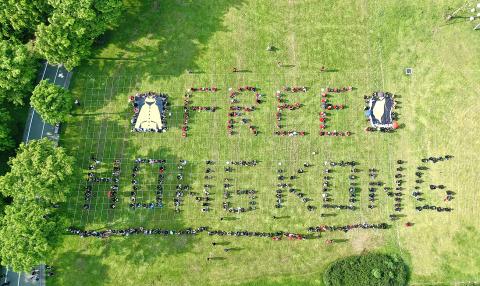About 300 people took part in a demonstration in support of pro-democracy protesters in Hong Kong, spelling out the words “Free Hong Kong” with their bodies in Taipei’s Central Art Park.
The event was organized by Hong Kong Outlanders, the Taiwan Youth Association for Democracy, Taiwan Association for Human Rights, Taiwan Citizen Front, Covenants Watch, the Presbyterian Church in Taiwan and several human rights groups.
In addition to the words, an image of Taiwan and one of “Raincoat Man” — honoring Marco Leung (梁凌杰), a Hong Konger who died on June 15 wearing a yellow rain poncho after falling from construction scaffolding in front of Pacific Place in the Admiralty district while hanging protest banners, were displayed.

Photo: Peter Lo, Taipei Times
The image shows that the public in Taiwan fully supports the people in Hong Kong in their pursuit of freedom, democracy and the rule of law, the organizers said.
As Hong Kong police continue to use excessive force to break up the continuing protests, and have even arrested pedestrians who were just shopping, Taiwan Association for Human Rights Secretary-General Chiu Ee-ling (邱伊翎) said the police have impeded press freedom, handled female protestors humiliatingly and arrested and pressed charges against minors.
The police have violated the Convention on the Elimination of All Forms of Discrimination Against Women and Convention on the Rights of the Child, she added.
A Hong Kong Outlanders representative, who identified himself as “Kuma,” said the Hong Kong government claimed that a general strike staged on Monday last week was aimed at destroying the territory’s economy by dividing the people.
“However, a stable economy should be founded on a free and democratic society. If Hong Kong loses this foundation, the assets owned by the Hong Kong people could disappear overnight. As Hong Kongers living in Taiwan, we support every citizen of Hong Kong who went on strike and walked out of classes last week, as they spoke out by taking actions against a twisted social order. They might miss a day’s work and miss a meal, but the fall of Hong Kong would be irreversible,” he said.
Hong Kongers decided to take to the streets day and night because their democratic system has been greatly eroded, and problems generated by ineffective government and an out-of-control police force cannot be addressed through the political system, he said.
Eve Lui (呂天忻), who represents Hong Kong Higher Institutions International Affairs Delegations, said Taiwan has witnessed how Hong Kong has fallen from a free and democratic state into an undemocratic one since 1997.
“Our elected legislators were being disqualified, our book publishers were kidnapped and our social activists were arrested and locked in prisons. A general election is still impossible for us, and Hong Kong is still ruled by a puppet from Beijing,” she said.
Participant Michelle Wu (吳奕柔) said that Beijing was ignoring “the Hong Kongers’ insistence that the territory maintain a free and democratic system.”

The CIA has a message for Chinese government officials worried about their place in Chinese President Xi Jinping’s (習近平) government: Come work with us. The agency released two Mandarin-language videos on social media on Thursday inviting disgruntled officials to contact the CIA. The recruitment videos posted on YouTube and X racked up more than 5 million views combined in their first day. The outreach comes as CIA Director John Ratcliffe has vowed to boost the agency’s use of intelligence from human sources and its focus on China, which has recently targeted US officials with its own espionage operations. The videos are “aimed at

STEADFAST FRIEND: The bills encourage increased Taiwan-US engagement and address China’s distortion of UN Resolution 2758 to isolate Taiwan internationally The Presidential Office yesterday thanked the US House of Representatives for unanimously passing two Taiwan-related bills highlighting its solid support for Taiwan’s democracy and global participation, and for deepening bilateral relations. One of the bills, the Taiwan Assurance Implementation Act, requires the US Department of State to periodically review its guidelines for engagement with Taiwan, and report to the US Congress on the guidelines and plans to lift self-imposed limitations on US-Taiwan engagement. The other bill is the Taiwan International Solidarity Act, which clarifies that UN Resolution 2758 does not address the issue of the representation of Taiwan or its people in

US Indo-Pacific Commander Admiral Samuel Paparo on Friday expressed concern over the rate at which China is diversifying its military exercises, the Financial Times (FT) reported on Saturday. “The rates of change on the depth and breadth of their exercises is the one non-linear effect that I’ve seen in the last year that wakes me up at night or keeps me up at night,” Paparo was quoted by FT as saying while attending the annual Sedona Forum at the McCain Institute in Arizona. Paparo also expressed concern over the speed with which China was expanding its military. While the US

SHIFT: Taiwan’s better-than-expected first-quarter GDP and signs of weakness in the US have driven global capital back to emerging markets, the central bank head said The central bank yesterday blamed market speculation for the steep rise in the local currency, and urged exporters and financial institutions to stay calm and stop panic sell-offs to avoid hurting their own profitability. The nation’s top monetary policymaker said that it would step in, if necessary, to maintain order and stability in the foreign exchange market. The remarks came as the NT dollar yesterday closed up NT$0.919 to NT$30.145 against the US dollar in Taipei trading, after rising as high as NT$29.59 in intraday trading. The local currency has surged 5.85 percent against the greenback over the past two sessions, central